贸易保护主义-中英文
- 格式:docx
- 大小:2.12 MB
- 文档页数:23
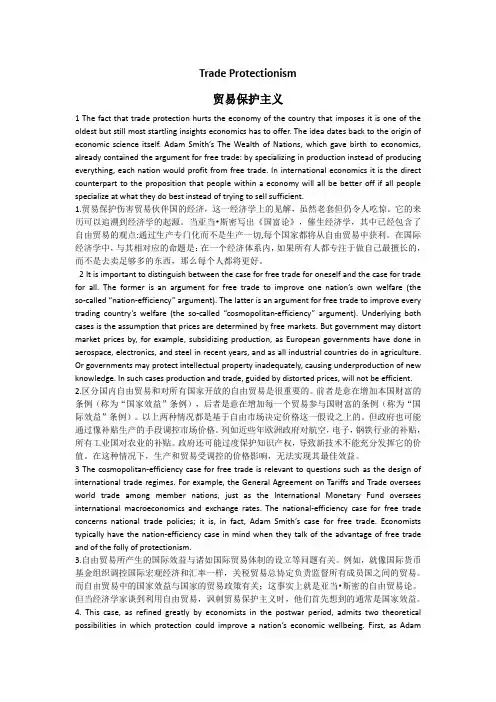
Trade Protectionism贸易保护主义1 The fact that trade protection hurts the economy of the country that imposes it is one of the oldest but still most startling insights economics has to offer. The idea dates back to the origin of economic science itself. Adam Smith’s The Wealth of Nations, which gave birth to economics, already contained the argument for free trade: by specializing in production instead of producing everything, each nation would profit from free trade. In international economics it is the direct counterpart to the proposition that people within a economy will all be better off if all people specialize at what they do best instead of trying to sell sufficient.1.贸易保护伤害贸易伙伴国的经济,这一经济学上的见解,虽然老套但仍令人吃惊。
它的来历可以追溯到经济学的起源。
当亚当•斯密写出《国富论》,催生经济学,其中已经包含了自由贸易的观点:通过生产专门化而不是生产一切,每个国家都将从自由贸易中获利。
在国际经济学中,与其相对应的命题是:在一个经济体系内,如果所有人都专注于做自己最擅长的,而不是去卖足够多的东西,那么每个人都将更好。
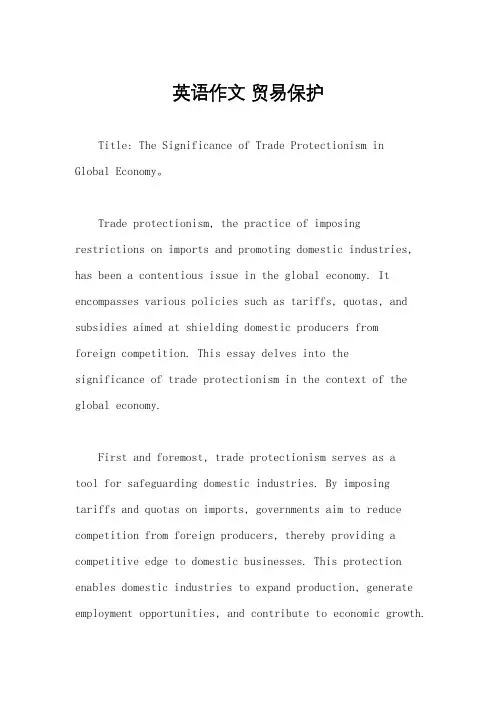
英语作文贸易保护Title: The Significance of Trade Protectionism inGlobal Economy。
Trade protectionism, the practice of imposingrestrictions on imports and promoting domestic industries, has been a contentious issue in the global economy. It encompasses various policies such as tariffs, quotas, and subsidies aimed at shielding domestic producers fromforeign competition. This essay delves into thesignificance of trade protectionism in the context of the global economy.First and foremost, trade protectionism serves as atool for safeguarding domestic industries. By imposingtariffs and quotas on imports, governments aim to reduce competition from foreign producers, thereby providing a competitive edge to domestic businesses. This protection enables domestic industries to expand production, generate employment opportunities, and contribute to economic growth.For instance, imposing tariffs on imported steel can protect domestic steel producers from being undercut by cheaper foreign imports, thus preserving jobs in the domestic steel industry.Moreover, trade protectionism is often utilized as a strategic measure to address trade imbalances and protect national security interests. Countries may resort to protectionist policies to reduce trade deficits and safeguard critical industries deemed vital for national security. For instance, imposing export restrictions on sensitive technologies can prevent adversaries from accessing crucial military capabilities, thereby enhancing national security.Furthermore, trade protectionism can foster the development of infant industries. By shielding nascent industries from foreign competition during their formative stages, governments can nurture their growth and competitiveness. Subsidies, tax incentives, and tariffs can be employed to support the development of infant industries until they become sufficiently competitive to withstandinternational competition. This approach has been instrumental in fostering industrialization and economic diversification in many developing countries.However, it is imperative to acknowledge the potential drawbacks of trade protectionism. One of the primary concerns is the escalation of trade tensions andretaliatory measures among trading partners. When countries impose protectionist policies, it often triggers a chain reaction of retaliatory measures, leading to a downward spiral of global trade. This can disrupt supply chains, increase consumer prices, and hamper economic growth on a global scale.Moreover, trade protectionism can undermine the principles of free trade and impede international cooperation. By erecting barriers to trade, countries risk eroding the gains achieved through decades of multilateral trade agreements and negotiations. This can hinder efforts to address pressing global challenges such as poverty alleviation, environmental sustainability, and economic development.In conclusion, trade protectionism remains a contentious issue in the global economy, with proponents advocating its benefits for domestic industries andnational security, while detractors highlight its potential adverse effects on global trade and economic cooperation. While trade protectionism can serve as a temporary measure to address specific challenges, policymakers must carefully weigh its implications and strive to strike a balance between protecting domestic interests and upholding the principles of free trade and international cooperation. Ultimately, fostering an open, rules-based trading systemis essential for promoting sustainable economic growth and prosperity on a global scale.。

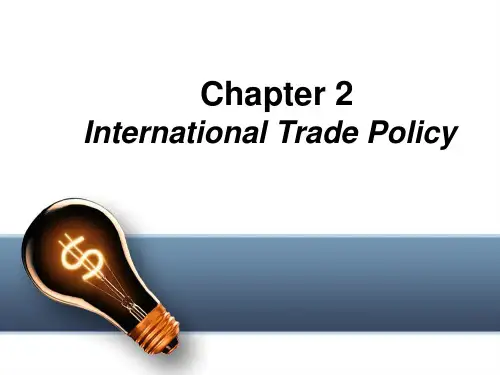
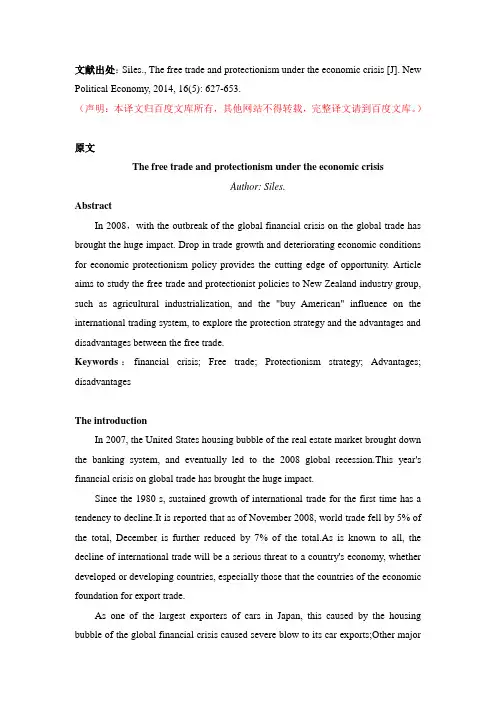
文献出处:Siles., The free trade and protectionism under the economic crisis [J]. New Political Economy, 2014, 16(5): 627-653.(声明:本译文归百度文库所有,其他网站不得转载,完整译文请到百度文库。
)原文The free trade and protectionism under the economic crisisAuthor: Siles.AbstractIn 2008,with the outbreak of the global financial crisis on the global trade has brought the huge impact. Drop in trade growth and deteriorating economic conditions for economic protectionism policy provides the cutting edge of opportunity. Article aims to study the free trade and protectionist policies to New Zealand industry group, such as agricultural industrialization, and the "buy American" influence on the international trading system, to explore the protection strategy and the advantages and disadvantages between the free trade.Keywords:financial crisis; Free trade; Protectionism strategy; Advantages; disadvantagesThe introductionIn 2007, the United States housing bubble of the real estate market brought down the banking system, and eventually led to the 2008 global recession.This year's financial crisis on global trade has brought the huge impact.Since the 1980 s, sustained growth of international trade for the first time has a tendency to decline.It is reported that as of November 2008, world trade fell by 5% of the total, December is further reduced by 7% of the total.As is known to all, the decline of international trade will be a serious threat to a country's economy, whether developed or developing countries, especially those that the countries of the economic foundation for export trade.As one of the largest exporters of cars in Japan, this caused by the housing bubble of the global financial crisis caused severe blow to its car exports;Other majorindustrialized economic system such as the European Union and similar also suffered a big blow.Although since early February 2009, the international trade has been showing signs of recovery, but still can see trade will always stay with before the financial crisis in a relatively low level.Drop in trade growth and deteriorating economic conditions to protect main economic policy provide the chance of a cutting edge.Nobody can clearly calculated how much and how long will last the world recession and the ubiquitous could panic emphasized the importance of economic protectionism, since the trade via the elimination of import tariffs and reduce the export tax free market.Different from free trade policy, trade protection is advocated by imported products add tariffs or other trade restrictions, such as direct subsidies mechanism, resistance to outsiders encroach on the local market.At present, there is a by increasing import customs taxes and surcharges for some countries to restore Zionist domestic trade growth pattern.The United States, for example, the government rescue plan announced in the "Buy American, Buy American" clause.Under this clause has been regarded as the recession a form of protectionism.The implementation of this clause, the New Zealand export driven to the brink of a global market.Preserved and protective strategies between free trade and the discussion of the advantages and disadvantages of the once again become the focus of the economic field.The purpose of this paper is to through research since by trade and protectionism policy to New Zealand industry set group (such as the agricultural industrialization), the influence of and the "buy American" influence on the international trading system, to discuss the problem.With the deepening of the study, related concepts of free trade and protectionism will be applied to the discussion.Second, the body of the free trade is associated with liberalism.According to the learned by the socialist economic base this principle, the elements of free markets and free trade is no government intervention.Capital and labor are the two fundamental elements in economic hair.In theory, labor and capital would flow from adverse market environment to the good air conditioning pletely free trading system is the guarantee of capital and Labour are themost advantageous production conditions of the premises.According to the classical theory of free trade, in the absence of government intervention, every country can find their own place in the world economic system, and better the condition of country will be richer than other countries.Therefore, reduce the regulation for import and export restrictions will be more conducive to free trade.The free trade policy is to support any to the construction of the free market.For example, to remove tariffs on imported products, reduce the export tax, as well as any legislation to clear the obstacles to labor productivity.Free trade treaties and changes of the agriculture development in New Zealand has a significant impact, New Zealand is a small, follow the rule of the free market type agricultural exporter, is currently the world's most open markets for agricultural pletely against protectionist stance, New Zealand agricultural industry is one of the most big beneficiaries of free trade policy.Since 1983 the government of New Zealand and Australia since the first free trade agreement, signed by regional and bilateral free trade agreement to become New Zealand agricultural products and market strategies of successful diversification.In 2005, for example, has established close economic partnership, with Thailand and Chile, brunei, Singapore, Malaysia and China free trade agreement, and negotiation of free trade terms and south Asian countries.Support the export of agricultural products trade policy is not does not make the agriculture department become the New Zealand government high agricultural subsidies object, on the contrary, the department of agriculture has become the New Zealand's largest source of export earnings.95% of New Zealand dairy products have been exported to other countries and regions of the world, meat and wool products is expected to reach 20% of New Zealand's total exports.The annual report in 2007, about 30% of world trade, dairy products from New Zealand dairy industry bring countries each year nearly 63 billion New Zealand dollars export income;While its exports of agricultural products value is about 15 to 16 million New Zealand dollars.These is helpful to agricultural economic strategy of free trade and market not only has made a outstanding contribution to the economic recovery of New Zealand, for the development of theagricultural sector and agricultural productivity growth also played a crucial role.This suggests that New Zealand in the mid - 1980 - s to the early 90 s cancel agricultural subsidies made the right decision, it promoted the rapid development of the commercial farming in New Zealand.Cancel agricultural subsidies triggered a fierce market competition mechanism, promote the efficiency of resource utilization and the diversity of products.Example, during 1983 and 2005, the average weight of the cattle grew by 15%, lamb grew by 28%, lamb grew by 18%.Believe that supporters of free trade policy of free trade policy to New Zealand agricultural guide to the correct development direction.2008 economic crisis makes the trade protection in different parts of the world alive.The New Zealand herald reported pointed out that the dairy industry The anger of New Zealand dairy industry.After experiencing the economic collapse, American farmers pay more attention to by foreign competitors bring loss caused by fierce competition.The report points out, the Washington announced "dairy industry export incentive plan", officially became "buy American" part of the rescue plan.The plan aims to improve the competitiveness of the dairy farming U.S. exporters in the global market.A comparative study of the United States, New ZealandThe U.S. government export subsidy plan will be pushed to the New Zealand agriculture risk to the edge.The New Zealand herald reported, the us government plan not only by the mass media criticism in New Zealand for "short-sighted", but also to convey to the world economy a wrong signal.Some scholars of New Zealand, the mass media and politicians say repeat of export subsidy policy beneath the New Zealand exports mechanism, and release the wrong message to the market interest rates.Snarr pointed out that to protect the "temporary" policy of the national commercial interests, often leads to competition in the market of lax.The temporary subsidy policy in the United States, is likely to increase international trade can last long with the cost of a long-term.Feenstra protectionist policies have discussed the us government's cost.He pointed out that the United States in the 80 s generation has restricted the number of imported Japanese cars into the soil, the government also soin order to make up for the economic consequences of the policy, American consumers have to accept the vehicle unit price soared 14% from the previous case, Washington government subsidy policy of Taiwan exports will disrupt the world agricultural market price system.And consumers (including the United States and other countries consumers) will have to pay for the consequences of this kind of protectionist policies.The more in-depth study of the "buy American" policy, is increasingly suspect this so-called tarp Actually destroys the bilateral relations.New Zealand and other WTO members will have to face by protecting the main economic pressures brought by the policy of righteousness.Actually the idea behind protectionism involving a maintain a positive trade balance.Washington is initially planned to use economic stimulus policies to balance the purpose of the government's huge trade and budget deficits.The government chose to adopt protectionist remedy to restore global economic decline.New Zealand in the face of the 20th century when the generation of the great recession in 80 Hou also made the same decision, set up a "buy" in New Zealand.But, with the United States "buy American" policy, in contrast, New Zealand "buy New Zealand goods" strategy for reducing the government's economic control start signal.The New Zealand government reduced tariffs on imported products, stimulate the native New Zealand products competitive on imported products and advertising boom.The Obama administration chose a reverse direction of economic policy to recovery the economic losses caused by the great recession.But the fact proved that, the government to reduce market interference, indeed promoted the sustained growth of the New Zealand economy.As more and more international trade and economic system tends to the free market system, the Obama administration chose to protectionist policies, Sue and run counter to the direction of trade development in the global economy.McGee had said that protectionism is not saving the medicine of the global recession.Conclusion the financial crisis of 2008 brought huge impact on global trade.Drop in trade growth and deteriorating economic conditions for the forefront of economic protectionism policy provides the opportunity to, for example,huasheng's government announced "buy American" article.ConclusionBased on New Zealand agricultural industry as an example, this paper discussed about the benefits and disadvantages of free trade and protection.According to the analysis of this article, it is obvious can find free trade treaty and its change has a significant influence on the development of agriculture in New Zealand.From "support the export of agricultural products trade policy did not make the agricultural sector object, the New Zealand government high agricultural subsidies to the agricultural sector has become the New Zealand's largest source of export income", this, can fully show cancel agricultural subsidies and promote free trade market mechanism to let got rapid development of agriculture in New Zealand.While the U.S. government export subsidy plan to New Zealand agricultural pushed to the brink of risk.Can only say that the government's export subsidies policy in Washington to disrupt the world agricultural market price system, and destroy the state of bilateral relations.Compared to the New Zealand government when facing the global economic crisis with the us government's response, the New Zealand government chose free trade market strategy, by lowering import tariffs and other policies to stimulate the economy, and then through the "buy New Zealand goods" campaign to boost the domestic goods competitive against imported goods.The U.S. government adopted a protectionist policies, by limiting the number of imported goods, such as "buy American" strategy to reduce the negative effects of the global economic crisis.However, when the major premise of liberalizing global economic system to market system environment, the Obama administration's protectionist economic decisions is run against the direction of the global economic recovery in trade.When the global economy is in a recession right now, protectionism system will undoubtedly have to say it's not a wise choice.(声明:本译文归百度文库所有,其他网站不得转载,完整译文请到百度文库。
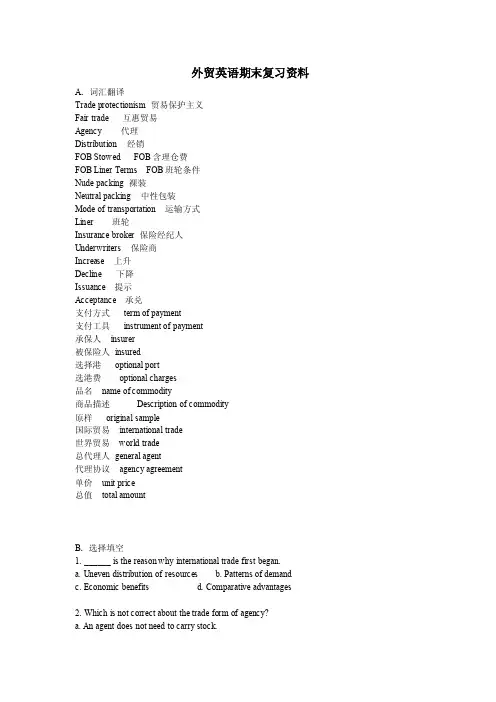
外贸英语期末复习资料A.词汇翻译Trade protectionism 贸易保护主义Fair trade 互惠贸易Agency 代理Distribution 经销FOB Stowed FOB含理仓费FOB Liner Terms FOB班轮条件Nude packing 裸装Neutral packing 中性包装Mode of transportation 运输方式Liner 班轮Insurance broker 保险经纪人Underwriters 保险商Increase 上升Decline 下降Issuance 提示Acceptance 承兑支付方式term of payment支付工具instrument of payment承保人insurer被保险人insured选择港optional port选港费optional charges品名name of commodity商品描述Description of commodity原样original sample国际贸易international trade世界贸易world trade总代理人general agent代理协议agency agreement单价unit price总值total amountB.选择填空1. ______ is the reason why international trade first began.a. Uneven distribution of resourcesb. Patterns of demandc. Economic benefitsd. Comparative advantages2. Which is not correct about the trade form of agency?a. An agent does not need to carry stock.b. Generally speaking, agents are usually paid by commission.c. An agent acts as a middleman between the principal and the customer.d. An agent can operate out of the marketing area authorized by the principal._a______ refers to an exchange of services or assets between countries.a. Invisible tradeb. V isible tradec. International traded. Balance of tradeWhich is not correct about the trade form of agency? _____da.An agent does not need to carry stock.b.Generally speaking, agents are usually paid by commission.c.An agent acts as a middleman between the principal and the customer.d.An agent can operate out of the marketing area authorized by the principal.Who has the exclusive right of selling the goods in a marketing area at the price he fixes? _____b a. Consignor b. Exclusive distributor c. Exclusive agent d. BidderUnder_____d___, the seller minimizes his obligations while the buyer obtains the goods at the lowest possible price.a. FOBb. DDPc. DESd. EXWWhen the seller pays for the goods to be placed alongside the vessel at the named port of shipment, the term is ______________ba. DEQb. FASc. FOBd. EXWThe sample made by the seller according to the buyer’s, and then sent to and confirmed by the buyer is called _______da. duplicate sampleb. returning samplec. original sampled. counter sample_____a___ are usually sold by sale by trade mark or brand name.a. Manufactured goods with steady quality b Raw materialsc. Machine and instrumentd. Goods with special shape___d___ transport is a major mode of transport in terms of capacity, only second to sea transport.a. Roadb. Airc. Containerd. Rail____b___ transport has a high distributive ability of offering a door-to-door service.a. Airb. Roadc. Sead. inland waterway_____c__ is the practice of sharing among many persons risks that would otherwise be suffered by only a few.a. Tradeb. Transportationc. Insuranced. DescriptionIn the marine cargo insurance practice, general average is ______a___a. a kind of partial lossb. a kind of total lossc. partial loss or total loss decided by the timed. constructive total lossTotal cost of exporting includes _____d___.a. production costb. sales pricec. production cost and all charge before exporting.d. production cost, allcharge and taxes before exporting.Which one is the best expression of unit price for international trade? ___c___a. CIF LONDON US$1010/MTb. CIF LONDON $1010.00/MTc.CIF LONDON US$1010.00/MTd. CIF LONDON $1010.00/TONWhich one of the following is not the means of remittance? _____a____a. L/Gb. M/Tc. T/Td. D/DT/T means ____b_____a. mail transferb. telegraphic transferc. demand draftd. letter of creditC.判断正误International trade is only the exchange of goods between nations. FCountries trade with each other partly because there is a cost advantage. TAn agent needs to carry stock as a distributor does. FThere is no contractual relationship between the principal and the customers under trade form of agency. FAll international business transactions are done under Inco terms 2000. FTrade terms can be called price terms because they stand for the price component. TDifferent commodities have different qualities, but the same commodity must have the same quality. FA term for defining one particular degree of quality in one country may have quite a different meaning in another country. TSea transport is the most important mode of transport in international trade now. TThe freight of liners is relatively fixed, while the freight of tramps is mainly determined by the market. TCargo transport insurance is to protect the interests of traders from any possible financial losses. FThe premium charged for the insurance policy is calculated according to the risks involved. TBoth money of account and money of payment must be stipulated in the contract clearly. FThe fluctuations of exchange rates may influence the interests of both exporter and importer. TRemittance involves four parties together. TAn L/C is a conditional bank undertaking of payment, and refers to banker’s credit. TD.翻译International trade is the exchange of goods and services between countries. It is also known as world trade, foreign trade or overseas trade.国际贸易即国与国之间商品和服务的交换。
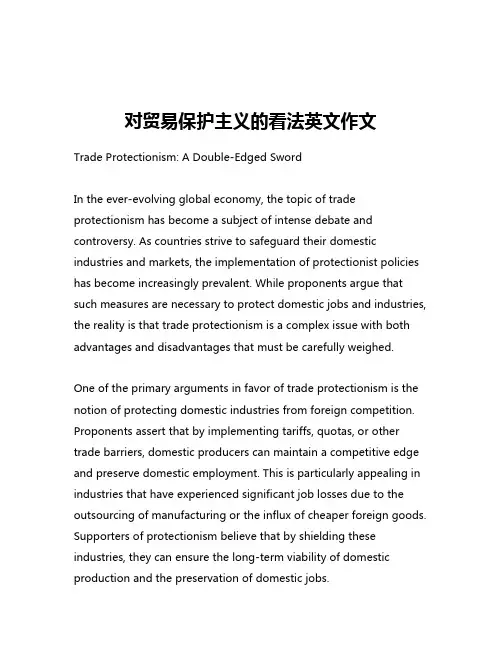
对贸易保护主义的看法英文作文Trade Protectionism: A Double-Edged SwordIn the ever-evolving global economy, the topic of trade protectionism has become a subject of intense debate and controversy. As countries strive to safeguard their domestic industries and markets, the implementation of protectionist policies has become increasingly prevalent. While proponents argue that such measures are necessary to protect domestic jobs and industries, the reality is that trade protectionism is a complex issue with both advantages and disadvantages that must be carefully weighed.One of the primary arguments in favor of trade protectionism is the notion of protecting domestic industries from foreign competition. Proponents assert that by implementing tariffs, quotas, or other trade barriers, domestic producers can maintain a competitive edge and preserve domestic employment. This is particularly appealing in industries that have experienced significant job losses due to the outsourcing of manufacturing or the influx of cheaper foreign goods. Supporters of protectionism believe that by shielding these industries, they can ensure the long-term viability of domestic production and the preservation of domestic jobs.Furthermore, advocates of trade protectionism argue that it can help foster the development of infant industries, which may struggle to compete with established foreign competitors. By providing a temporary shield from international competition, these industries can have the opportunity to grow, innovate, and ultimately become more competitive on the global stage. This approach is often employed by developing countries seeking to build up their industrial capabilities and reduce their reliance on imports.However, the drawbacks of trade protectionism are significant and must be carefully considered. One of the primary criticisms is that protectionist policies can lead to retaliation from trading partners, sparking a trade war that ultimately harms all parties involved. When countries erect trade barriers, their trading partners may respond in kind, leading to a cycle of escalating tariffs and trade restrictions. This can disrupt global supply chains, increase consumer prices, and ultimately undermine the free flow of goods and services that is essential for economic growth and prosperity.Moreover, trade protectionism can have unintended consequences that harm domestic consumers and businesses. By shielding domestic industries from foreign competition, protectionist policies can lead to higher prices, reduced product variety, and a lack of innovation. Consumers may be forced to pay more for goods andservices, while businesses that rely on imported raw materials or components may face higher costs, reducing their competitiveness in both domestic and international markets.Additionally, trade protectionism can have broader economic implications, such as the potential for retaliatory tariffs on domestic exports, which can harm industries that rely on international trade. This can lead to job losses and reduced economic growth, ultimately undermining the very industries that the protectionist policies were intended to protect.It is also important to consider the impact of trade protectionism on the global economy as a whole. In an increasingly interconnected world, where countries rely on international trade and investment to drive economic growth, protectionist policies can disrupt the delicate balance of global trade and investment flows. This can lead to reduced economic efficiency, decreased innovation, and a slowdown in the overall pace of economic progress.In conclusion, the debate over trade protectionism is a complex and multifaceted issue. While proponents argue that it is necessary to protect domestic industries and jobs, the reality is that trade protectionism is a double-edged sword with both advantages and disadvantages. Policymakers must carefully weigh the potential benefits against the potential drawbacks, taking into account thebroader economic and geopolitical implications of their decisions. Ultimately, a balanced and nuanced approach that recognizes the complexities of global trade is essential for promoting long-term economic prosperity and stability.。
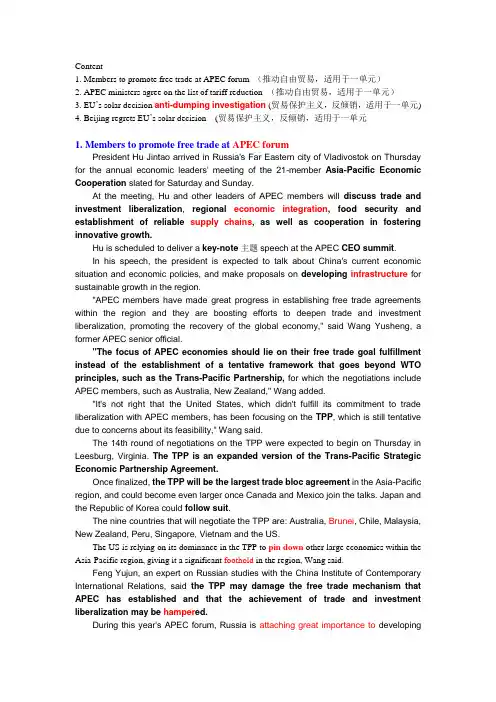
Content1. Members to promote free trade at APEC forum (推动自由贸易,适用于一单元)2. APEC ministers agree on the list of tariff reduction (推动自由贸易,适用于一单元)3. EU’s solar decision anti-dumping investigation (贸易保护主义,反倾销,适用于一单元)4. Beijing regrets EU’s solar decision (贸易保护主义,反倾销,适用于一单元1. Members to promote free trade at APEC forumPresident Hu Jintao arrived in Russia's Far Eastern city of Vladivostok on Thursday for the annual economic leaders' meeting of the 21-member Asia-Pacific Economic Cooperation slated for Saturday and Sunday.At the meeting, Hu and other leaders of APEC members will discuss trade and investment liberalization, regional economic integration, food security and establishment of reliable supply chains, as well as cooperation in fostering innovative growth.Hu is scheduled to deliver a key-note主题speech at the APEC CEO summit.In his speech, the president is expected to talk about China's current economic situation and economic policies, and make proposals on developing infrastructure for sustainable growth in the region."APEC members have made great progress in establishing free trade agreements within the region and they are boosting efforts to deepen trade and investment liberalization, promoting the recovery of the global economy," said Wang Yusheng, a former APEC senior official."The focus of APEC economies should lie on their free trade goal fulfillment instead of the establishment of a tentative framework that goes beyond WTO principles, such as the Trans-Pacific Partnership, for which the negotiations include APEC members, such as Australia, New Zealand," Wang added."It's not right that the United States, which didn't fulfill its commitment to trade liberalization with APEC members, has been focusing on the TPP, which is still tentative due to concerns about its feasibility," Wang said.The 14th round of negotiations on the TPP were expected to begin on Thursday in Leesburg, Virginia. The TPP is an expanded version of the Trans-Pacific Strategic Economic Partnership Agreement.Once finalized, the TPP will be the largest trade bloc agreement in the Asia-Pacific region, and could become even larger once Canada and Mexico join the talks. Japan and the Republic of Korea could follow suit.The nine countries that will negotiate the TPP are: Australia, Brunei, Chile, Malaysia, New Zealand, Peru, Singapore, Vietnam and the US.The US is relying on its dominance in the TPP to pin down other large economies within the Asia-Pacific region, giving it a significant foothold in the region, Wang said.Feng Yujun, an expert on Russian studies with the China Institute of Contemporary International Relations, said the TPP may damage the free trade mechanism that APEC has established and that the achievement of trade and investment liberalization may be hamper ed.During this year's APEC forum, Russia is attaching great importance to developingtrade and investment with Asian countries, as its previous main exporting destinations - the European Union and the US - are experiencing sluggish markets, Feng said.China and Russia plan to increase their trade value to $100 billion by 2015, with bilateral trade expected to enter a fast-growth period.The Pacific Economic Cooperation Council said in its latest survey release d in Vladivostok that growth in the Asia-Pacific region this year is expected to increase slightly to 3.7 percent from last year's 3.5 percent.China is considered the best place for growth in the Asia-Pacific region, according to the Pacific Economic Cooperation Council, an APEC observer.China has signed 10 FTAs including those with the Association of Southeast Asian Nations, Pakistan and Peru.Yi Xiaozhun, China's vice-minister of commerce, said earlier that China will actively advance the FTA strategy to promote the integration of Asia-Pacific economies.2. APEC ministers agree on list of tariff reductionVLADIVOSTOK - Ministers from 21 Asia-Pacific Economic Cooperation (APEC) member economies on Thursday agreed to present a list of 54 items of goods for tariff reduction to the upcoming APEC informal economic leaders' meeting for approval.The ministers managed to form a list of 25 items of goods for tariff reduction on Wednesday, the first day of their meeting, Russian Economy Minister Andrei Belousov told a press conference Thursday."It will be a shame to have only 25 items of goods for trade tariff reduction," he said, "And the ministers agreed today to increase the list to include 54 items of goods which, when approved by the leaders of the APEC meeting, will get a tariff reduction to the level of 5 percent by 2015."When asked to identify some of the listed items, he clarified that the agreed items were not green goods themselves but rather goods which will be helpful to the improvement of environmental protection."Goods like measuring and controlling instruments," he said.The Russian host highlighted efforts of the APEC member economies in reducing trade tariffs for goods which help the environment.With the World Trade Organization, it has been over 10 years to make the progress. But with APEC, the bloc has already made some progress under the Russian presidency, Belousov said, describing the agreed list as a "substantial" progress.Asked why the press conference was postponed by more than two hours and whether the delay was caused by opinion conflicts among the ministers, Belousov said different opinions did exist among developed and emerging economies within APEC with countries like the United States and Canada on one end of the spectrum范围,幅度and China, Indonesia and small countries on the other end."They have different opinions because they face different problems," said the minister. "But APEC agreements are consensus-based decisions基于协商一致的决策so I would not call the difference a conflict."After being approved by the leaders attending the APEC economic leaders meeting scheduled for the weekend, the trade tariff reduction agreement made in Vladivostok willbe a step toward the envisage d想像,设想;正视,面对;free trade mechanism for the entire APEC region3. Experts say EU's solar decision is 'destructive'(anti-dumpinginvestigation)China observers in Europe said that the opening of an anti-dumping investigation into Chinese solar panel exports by Brussels is "unfortunate, destructive and not smart" while urging Beijing to react reasonably to avoid an escalation扩大,增加.The experts said that they don't believe officials in Brussels "deliberately" announced the decision on Thursday to gain more bargaining power over Beijing when both sides hold a leaders' meeting in two weeks in Europe."In order to avoid a destructive trade war and turn Brussels' destructive move into something positive, it would be good if China responds by asking for a broader review of WTO rules when it comes to environmental goods and services," said Dennis Pamlin, founder of Sweden-based 21st Century Frontiers.He said that the Brussels move is "not smart" as Europe claims to be a green champion.On Thursday, the European Commission announced the opening of an anti-dumping investigation into Chinese solar products exports. The volume of China's photovoltaic光电的products exports to Europe was about 21 billion euros ($26.4 billion) last year.Giles Merritt, secretary-general of Brussels-based think tank Friends of Europe, said the timing of the investigation was not set deliberately, but is rather an unfortunate coincidence as it is right before the EU-China summit.He said that European Commission officials are playing the roles of judges and lawyers, instead of politicians, and that they don't realize how politically sensitive the move is."I don't think the Chinese government needs to worry too much," said Merritt, adding that Beijing can ignore the political aspect and look at it as a legal case."Technical procedures should be the point the Chinese government has to pay attention to, as that is in everybody's interest," said Merritt.Merritt believes the move will not damage EU-China relations too much in the short term, but that on a long-term perspective, China needs to think about the implications.He said that more efforts should be made from the European side, and that commission officials should try to understand how sensitive the move is.Shada Islam, head of policy at Friends of Europe, agreed with Merritt, saying the action is unfortunate but not deliberate."China can react with reasonable moderation and avoid overplaying it," Islam said. She said both Beijing and Brussels should work together in a mature manner and not allow one case to damage the entire EU-China relations, especially when enormous effort has been made by both sides to promote its development.The upcoming EU-China summit is the second after both sides met in Beijing in February.David Fouquet, senior associate of the Brussels-based European Institute of AsianStudies, said that this is a regular trade dispute rather than a dramatic and sudden shock. Despite the occasional disputes, Fouquet said EU-China relations are developing as a stable and mature partnership with high interdependency, which is too big to fail. He said both sides have learned to deal with the problems with rational ity and maturity."What we need to avoid now is dramatization使戏剧化, actions should be taken by the leaders to de-dramatize the influence of such specific cases so as not to affect the entire good mutual relationship," said Fouquet.4. Beijing 'regrets' EU solar decisionAnti-dumping investigation will damage sector globally, analysts say Beijing "deeply regrets" the decision by the European Commission to launch an investigation into the alleged dumping of solar panel products.The probe is expected to damage the industry globally.China exported nearly $26 billion of solar panels and products to Europe last year."China deeply regrets that the European Commission decided to start the probe, even though the country has called many times to solve the problem through discussions and cooperation," Shen Danyang, spokesman of the Ministry of Commerce, said in a statement on Thursday."Restricting China's solar panel products will not only hurt the interests of both Chinese and European industry, it will also undermine the healthy development of the global solar and clean energy sector."He urged the European Union to scrap protectionist measures and not to introduce new protectionist trade and investment policies before 2014.The EU statement said the investigation is expected to last 15 months. But "it is possible according to trade defense rules to impose provisional anti-dumping duties within 9 months, provided there is sufficient prima facie evidence of dumping''.Chinese manufacturers of solar — or photovoltaic— panels have denied that China was providing any illegal subsidies,noting that the industry is in the midst of a radical transition as the cost of products drops.There were warnings that Beijing will retaliate报复.The case will be the largest trade dispute involving China, said Xu Ruilin, head of the Solar Industry Association in Jiangsu province, where most major solar companies are located.The investigation came after a complaint by a group of European solar companies in July led by Germany's SolarWorld AG. The company also started anti-dumping and subsidy cases concerning China's solar panel exports to the US in October 2011.The US Commerce Department in May levied tariffs against several Chinese manufacturers, alleging they sold their products below cost.China exports $35.8 billion of solar products last year.The EU move is a blow against China's solar industry, said Zhou Shijian, a senior trade expert at Tsinghua University.Solar: Domestic market will play increasing role"The probes by the US and the EU into Chinese solar products are not based oneconomics. They are political and aim to seize a vantage place in the new energy industry," he said. "It's time for the government to stand up."Sang Baichuan, head of the Institute of International Business at the University of International Business and Economics in Beijing, said the investigation will add pressure on exports.He urged the government to take countermeasures.A European Commission source, who declined to be identified, said the launch of the anti-dumping case was "legally necessary".Coincidentally, the investigation was announced just as the annual report of the European Union Chamber of Commerce in China called for more equal market access for European businesses.The investigation will issue a provisional finding within nine months, the source said. The European Council will make a final decision on the case by Dec 5, 2013.Dennis Pamlin, founder of Sweden-based consultancy company 21st New Frontiers, said the decision by Brussels "was not smart" if the EU wants to champion为…而斗争,捍卫,声援a low-carbon era低碳时代.Brussels attacking China for providing low prices for solar solutions not only undermines the EU as a green champion绿色冠军, it also demonstrates that the EU looks at short-term populism instead of long-term collaboration and employment有益的活动, Pamlin said.Chinese industrial associations reacted in a more focused way than they did when the United States introduced tariffs.As the representative of Chinese solar companies, the China Chamber of Commerce for the Import and Export of Machinery and Electronic Products immediately announced its objection and dissatisfaction to the decision on Thursday afternoon.It mentioned the recent visit to Beijing by the German Chancellor Angela Merkel who said countries should solve trade disputes through dialogue. "We hope that European countries can take measures against protectionism and maintain stable and healthy development between the two sides," the statement said.Sang Baichuan with the University of International Business and Economics said it's necessary for solar panel makers to reduce dependence on developed markets and cultivate emerging markets.At present, about 90 percent of Chinese solar products are exported.Zhao Yuwen, vice-chairman of the Chinese Solar Energy Society, said the key to solving the problem of China's solar industry is to expand the domestic market."The government should balance manufacturing industries and market demand," he said.He said that the possibility of the European Commission winning the case is high.Darren Thompson, managing director of the European branch of Yingli Green Energy, said protectionism will damage the solar industry.Protectionism will stop declining costs, which will lead to more government subsidies for the industry, he said.Gao Jifan, CEO of Trina Solar, said that Chinese solar companies have to raise quality, regulate the market and enhance international cooperation。
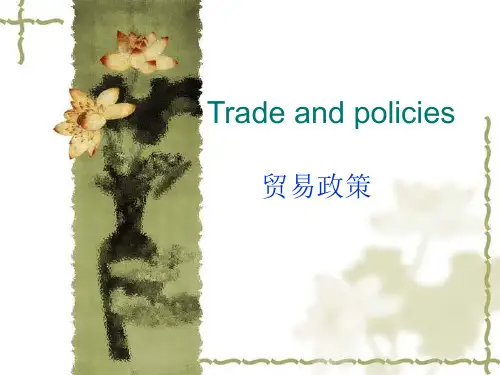
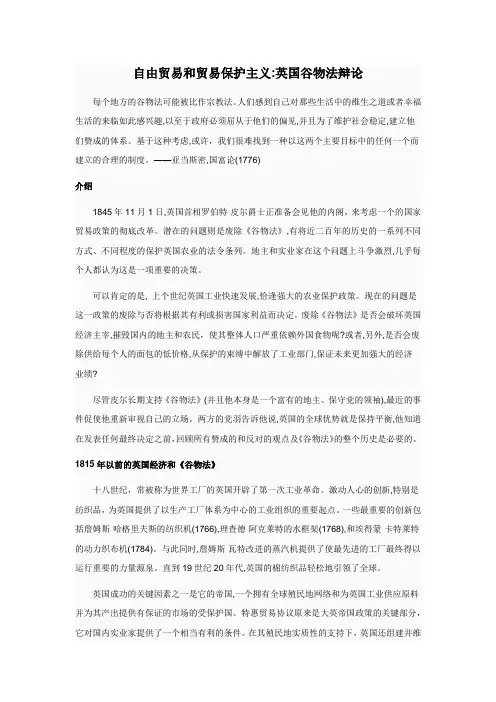
自由贸易和贸易保护主义:英国谷物法辩论每个地方的谷物法可能被比作宗教法。
人们感到自己对那些生活中的维生之道或者幸福生活的来临如此感兴趣,以至于政府必须屈从于他们的偏见,并且为了维护社会稳定,建立他们赞成的体系。
基于这种考虑,或许,我们很难找到一种以这两个主要目标中的任何一个而建立的合理的制度。
——亚当斯密,国富论(1776)介绍1845年11月1日,英国首相罗伯特·皮尔爵士正准备会见他的内阁,来考虑一个的国家贸易政策的彻底改革。
潜在的问题则是废除《谷物法》,有将近二百年的历史的一系列不同方式、不同程度的保护英国农业的法令条列。
地主和实业家在这个问题上斗争激烈,几乎每个人都认为这是一项重要的决策。
可以肯定的是, 上个世纪英国工业快速发展,恰逢强大的农业保护政策。
现在的问题是这一政策的废除与否将根据其有利或损害国家利益而决定。
废除《谷物法》是否会破坏英国经济主宰,摧毁国内的地主和农民,使其整体人口严重依赖外国食物呢?或者,另外,是否会废除供给每个人的面包的低价格,从保护的束缚中解放了工业部门,保证未来更加强大的经济业绩?尽管皮尔长期支持《谷物法》(并且他本身是一个富有的地主、保守党的领袖),最近的事件促使他重新审视自己的立场。
两方的党羽告诉他说,英国的全球优势就是保持平衡,他知道在发表任何最终决定之前,回顾所有赞成的和反对的观点及《谷物法》的整个历史是必要的。
1815年以前的英国经济和《谷物法》十八世纪,常被称为世界工厂的英国开辟了第一次工业革命。
激动人心的创新,特别是纺织品,为英国提供了以生产工厂体系为中心的工业组织的重要起点。
一些最重要的创新包括詹姆斯·哈格里夫斯的纺织机(1766),理查德·阿克莱特的水框架(1768),和埃得蒙·卡特莱特的动力织布机(1784)。
与此同时,詹姆斯·瓦特改进的蒸汽机提供了使最先进的工厂最终得以运行重要的力量源泉。
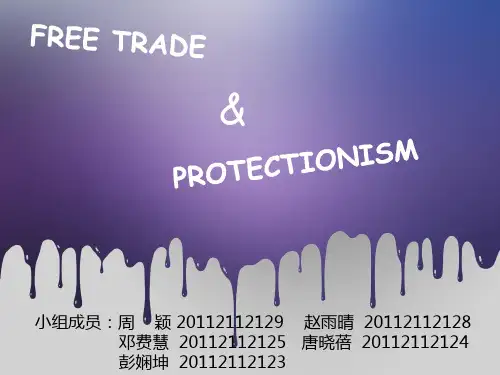
拒绝贸易保护英文作文"Agnst Trade Protectionism"In today's globalized world, trade plays a crucial role in promoting economic growth and development. However, there is a growing threat of trade protectionism that can have detrimental effects on international trade and economies.Trade protectionism refers to the policies and measures taken countries to restrict imports or protect their domestic industries. This can include imposing tariffs, quotas, and other barriers to trade. While countries may clm to be doing it to safeguard their national interests, in reality, it often leads to negative consequences.Firstly, trade protectionism disrupts the smooth flow of international trade. When tariffs and other barriers are rsed, it increases the cost of goods and services, making them less petitive in the global market. This can result in reduced trade volumes, job losses in export-oriented industries, and a slowdown in economic growth.Moreover, it creates an unfr playing field. Instead of peting based on the quality and petitiveness of their products and services, countries may rely on protectionist measures to shield their industries from foreign petition. This hampers innovation and technological progress as it discourages firms from investing in research and development to improve their offerings.Furthermore, trade protectionism undermines the principles of free trade and globalization. Free trade has been a driving force behind the prosperity of many countries allowing for the efficient allocation of resources and the exchange of ideas and technologies. By erecting barriers to trade, countries are going agnst the very essence of a globalized economy.We must firmly oppose trade protectionism and work towards promoting open and fr trade. International cooperation is essential to ensure that trade policies are based on rules and principles that benefit all countries. We need tostrengthen multilateral trade institutions and work towards resolving disputes through diplomatic means rather than resorting to protectionist measures.Only embracing free trade and working together can we build a more prosperous and sustnable global economy. We should remember that trade is a two-way street that benefits everyone when it is conducted in an open and cooperative manner. Let us reject trade protectionism and strive for a world of greater economic integration and cooperation.。
Protectionism(贸易保护主义)A sandwich is the perfect thing when you're hungry and its pretty cheap .... there was a time in the early part of the 19th Century when many people in Britain couldn't afford even this staple food and ended up getting poorer and left hungrier. In 1815 the British Government introduced the Corn Laws.They introduced these laws as a way to prevent import of cheap foreign grain from bringing the price of British grain down and risking British farmers and their incomes. Until 1815,, Britain freely traded with neighboring countries .... the poor people of Britain relied on cheap imported grain rather than the more expensive domestically produced grain. In the end, many couldn't afford to buy any grain and went hungry.三明治在你很餓又沒什麼錢的時候是最好的選擇,但在19世紀初期,很多英國人連這樣的食物都買不起,最後變得越來越貧困、飢餓。
英语作文贸易保护Title: The Debate on Trade Protectionism。
In today's globalized world, the issue of trade protectionism has sparked heated debates among policymakers, economists, and the public alike. While some argue in favor of protectionist measures to safeguard domestic industries, others advocate for free trade to promote economic growth and international cooperation. This essay delves into the complexities of trade protectionism, exploring its rationales, consequences, and potential alternatives.Firstly, it is crucial to understand the motives behind trade protectionism. One primary rationale is to shield domestic industries from foreign competition, thereby preserving jobs and ensuring economic stability. Byimposing tariffs, quotas, or subsidies on imported goods, governments aim to make domestic products more competitivein the market. Additionally, proponents of protectionism often cite national security concerns, arguing thatreliance on foreign goods could compromise a nation's autonomy and resilience in times of crisis.However, while trade protectionism may offer short-term benefits to certain industries, its long-term consequences are subject to debate. One notable drawback is itspotential to trigger retaliatory measures from trading partners, leading to a harmful cycle of escalating trade barriers known as a "trade war." Such conflicts not only disrupt global supply chains but also dampen consumer confidence and hinder overall economic growth. Moreover, protectionist policies can distort market dynamics, leading to inefficiencies, reduced innovation, and higher pricesfor consumers.In contrast, proponents of free trade advocate for removing barriers to international commerce, arguing thatit fosters competition, innovation, and specialization. By allowing goods and services to flow freely across borders, free trade enables countries to capitalize on their comparative advantages, leading to higher productivity and lower prices for consumers. Furthermore, proponents contendthat free trade promotes diplomatic cooperation and fosters peaceful relations between nations, as economic interdependence creates mutual incentives for collaboration and conflict resolution.Nevertheless, critics of free trade warn of itspotential downsides, particularly regarding incomeinequality and job displacement. They argue thatunrestricted trade can exacerbate disparities within and between countries, as industries that cannot competeglobally may face layoffs and wage stagnation. Additionally, skeptics highlight the risks of outsourcing and offshoring, which can undermine domestic employment and weaken labor protections in pursuit of cheaper labor abroad.In light of these competing perspectives, striking a balance between trade liberalization and protectionism remains a formidable challenge for policymakers. Ratherthan adopting a one-size-fits-all approach, many advocatefor nuanced strategies that address the concerns of bothfree trade proponents and protectionists. For instance, governments could invest in education and retrainingprograms to equip workers with the skills needed to thrive in a globalized economy. They could also negotiate trade agreements that incorporate provisions for labor rights, environmental sustainability, and fair competition, thereby ensuring that the benefits of trade are more equitably distributed.In conclusion, the debate on trade protectionism reflects the complexities of balancing economic interests, national priorities, and global interdependence. While proponents of protectionism emphasize the importance of safeguarding domestic industries and national security, advocates of free trade stress the benefits of openness, competition, and cooperation. As countries navigate the challenges of an increasingly interconnected world, finding common ground on trade policy will require dialogue, compromise, and a recognition of the diverse perspectives at play. Only through collaborative efforts can nations forge a path towards sustainable and inclusive economic growth for all.。
贸易保护主义的英文翻译贸易保护主义英文怎么说贸易保护主义的英文例句贸易保护主义的英文翻译与发音贸易保护主义贸易保护主义的中英文例句与用法提交更多贸易保护主义的相关例句贸易保护主义的相关词汇及其英文翻译贸易保护主义的英文翻译与发音[màoyì bǎohùzhǔyì]trade protectioni ...trade [treid]n.贸易,商业,交易,生意,职业,行业,[气]信风,顾客vi.交易,买卖,经商,对换,购物 vt.用...进行交换protectioni ... [prә'tekʃ(ә)niz(ә)m]n.保护主义贸易保护主义的中英文例句与用法另一个原因是它讨厌给贸易保护主义议员(攻击中国)提供弹药。
Another reason is that it is loth to give ammunition to the protectionist lobby.贸易保护主义和贸易歧视。
Unsafe chinese products and we're against trade protectioni ... and discrimination.贸易保护主义有所抬头,贸易摩擦加剧。
Trade protectioni ... is gaining ground resulting in heightened trade frictions.事实表明,一旦经济陷入衰退,贸易保护主义就会抬头。
Trade protectioni ... begins to prevail when economic depression occurs.他也是美国的贸易保护主义幽灵。
He'll also be trailing the specter of rising protectioni ... in america.我们放弃了贸易保护主义政策,开始鼓励外商投资。
贸易保护主义-中英文Trade Protectionism贸易保护主义1 The fact that trade protection hurts the economy of the country that imposes it is one of the oldest but still most startling insights economics has to offer. The idea dates back to the origin of economic science itself. Adam Smith’s The Wealth of Nations, which gave birth to economics, already contained the argument for free trade: by specializing in production instead of producing everything, each nation would profit from free trade. In international economics it is the direct counterpart to the proposition that people within a economy will all be better off if all people specialize at what they do best instead of trying to sell sufficient.1.贸易保护伤害贸易伙伴国的经济,这一经济学上的见解,虽然老套但仍令人吃惊。
它的来历可以追溯到经济学的起源。
当亚当•斯密写出《国countries do in agriculture. Or governments may protect intellectual property inadequately, causing underproduction of new knowledge. In such cases production and trade, guided by distorted prices, will not be efficient.2.区分国内自由贸易和对所有国家开放的自由贸易是很重要的。
前者是意在增加本国财富的条例(称为“国家效益”条例),后者是意在增加每一个贸易参与国财富的条例(称为“国际效益”条例)。
以上两种情况都是基于自由市场决定价格这一假设之上的。
但政府也可能通过像补贴生产的手段调控市场价格。
列如近些年欧洲政府对航空,电子,钢铁行业的补贴,所有工业国对农业的补贴。
政府还可能过度保护知识产权,导致新技术不能充分发挥它的价值。
在这种情况下,生产和贸易受调控的价格影响,无法实现其最佳效益。
3 The cosmopolitan-efficiency case for free trade is relevant to questions such as thedesign of international trade regimes. For example, the General Agreement on Tariffs and Trade oversees world trade among member nations, just as the International Monetary Fund oversees international macroeconomics and exchange rates. The national-efficiency case for free trade concerns national trade policies; it is, in fact, Adam Smith’s case for free trade. Economists typically have the nation-efficiency case in mind when they talk of the advantage of free trade and of the folly of protectionism.3.自由贸易所产生的国际效益与诸如国际贸易体制的设立等问题有关。
例如,就像国际货币基金组织调控国际宏观经济和汇率一样,关税贸易总协定负责监督所有成员国之间的贸易。
而自由贸易中的国家效益与国家的贸易政策有关;这事实上就是亚当•斯密的自由贸易论。
但当经济学家谈到利用自由贸易,讽刺贸易保护主义时,他们首先想到的通常是国家效益。
4. This case, as refined greatly byeconomists in the postwar period, admits two theoretical possibilities in which protection could improve a nation’s economic wellbeing. First, as Adam Smith himself noted, a country might be able to use threat of protection to get other countries to reduce their protection against its exports. Thus, threatened protection could be a tool to pry open foreign market, like oysters, with “a strong clasp knife,” as Lord Randolph Churchill put it the late nineteenth century. If the protectionist threat worked, then the county using it would gain doubly: form its own free trade and from its trading partners’ free trade as well. However, both Smith and later economists in Britain feared that such threats would not work. They feared that the protection imposed as a threat would be permanent and that the threat would not lower the other countries’trade barriers.4.这种观点,在二战后被经济学家热捧,他们认同能够有助于国家经济的两种理论。
首先,正如亚当•斯密本人所指出的,一个国家可能通过贸易保护来胁迫其他国家减少针对其出口产品的贸易保护。
因此,贸易保护的威胁也可以作为工具来撬开国际市场,像牡蛎,伦道夫·丘吉尔勋爵利用它作为“一把强势的折刀”打入19世纪末的市场。
如果贸易保护威胁论有效,那么利用它的国家将会得到双重影响:形成自己内部的自由贸易和形成与贸易伙伴国的自由贸易。
然而,斯密和之后的经济学家都担心这种威胁不会有效。
他们担心贸易保护的威胁是永久性的,而这种威胁并不能降低其他国家的贸易壁垒。
5.The trade policy of the united states today is premised on a different assessment: that indeed U.S markets can, and should, be closed as a means of opening new markets abroad. This premise underlies sections 301 through 310 of the 1988 Omnibus Trade and competitiveness Act. These provisions permit, and sometimes even require, the U.S government to force other countries into accepting new trade. They can , for instance,take the form of voluntary quotas on exports of certain goods to the United States. Thus, they may simply force weak nations to redirect their trade in ways that strong nations desire, cutting away at the principle that trade should be guided by market prices.5.美国如今的贸易政策是以不同的评估意见为前提的:即事实上美国市场能够,并且应该被关闭,以打开新的国外市场。
这个前提是基于1988年《综合贸易竞争法》的301条到310条,这些条款允许,有时甚至需要,美国政府迫使其他国家接受新的贸易。
例如,他们可以采取自愿的形式将某些商品出口到美国。
因此,他们可能只是迫使弱小国家定向向贸易强国出口他们需要的产品,违背了贸易应遵循市场价格的原则。
6.The second exception in which protection could improve a nation’s economic well-being is when a country has monopoly power over a good. Since the time of JohnStuart Mill, economists have argued that a country produces a large percentage of the world’s output of a good can use an “optimum”tariff to take advantage of its latent monopoly power and, thus, gain more from trade. This is, of course, the same as saying that a monopolist will maximize his profits by raising his price and reducing his output.6.其次,当一个国家能够垄断一种商品时,贸易保护就能够增加这个国家的经济利益。